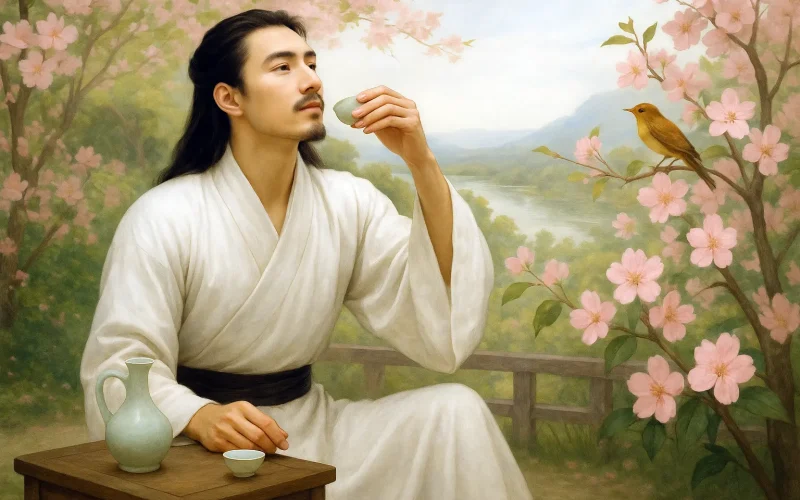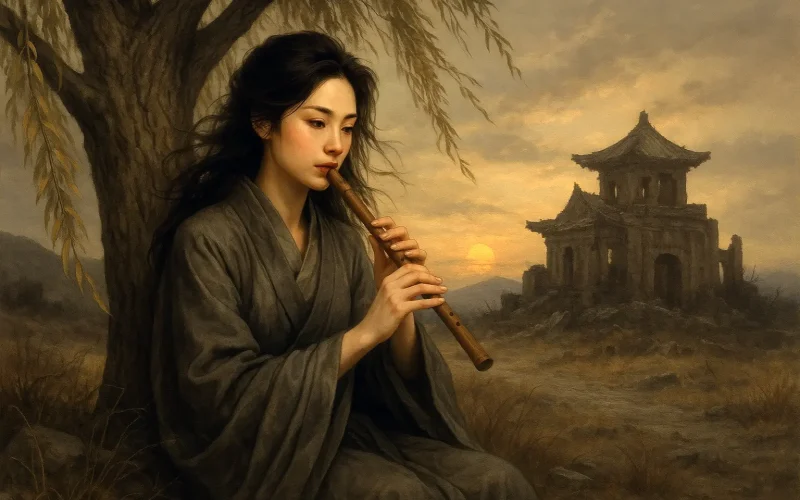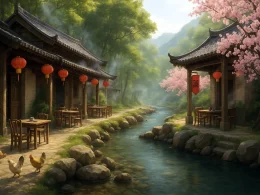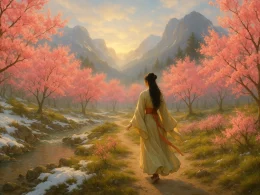With a blue silken cord is bound
A jade wine pot. Why are you so slow?
The mountain flowers smile at me now;
It’s time to drink a cup, I know.
I drink alone by east window still;
There orioles sing to their fill.
The vernal wind and I are fain
To revel now and once again.
Original Poem:
「待酒不至」
李白
玉壶系青丝,沽酒来何迟。
山花向我笑,正好衔杯时。
晚酌东窗下,流莺复在兹。
春风与醉客,今日乃相宜。
Interpretation:
This poem depicts the poet drinking and reveling in a spring day, showcasing a contented and carefree state of mind. In ancient times, drinking was not only a way for literati to express emotions but also a life attitude that embodied their sentiments. Through imagery such as the spring breeze, mountain flowers, and orioles, the poet blends the beauty of nature with the joy of drinking, expressing both a cherishment of beautiful moments and a free-spirited philosophy of following nature and seizing the day.
First Couplet: "玉壶系青丝,沽酒来何迟。"
Yù hú xì qīng sī, gū jiǔ lái hé chí.
The jade pot tied with a green silk ribbon is ready—why is the wine buyer so delayed?
The opening line highlights the poet’s anticipation for wine. The "jade pot" symbolizes precious fine wine, while "so delayed" reveals an impatient eagerness, reflecting the poet’s ardent longing for drinking.
Second Couplet: "山花向我笑,正好衔杯时。"
Shān huā xiàng wǒ xiào, zhèng hǎo xián bēi shí.
Mountain flowers smile at me—now is the perfect time to raise a cup.
" Mountain flowers smile at me" uses personification to depict the bright scenery of spring, infusing nature with vitality and hinting at the poet’s inner joy. "Perfect time to raise a cup" naturally leads to the theme, indicating that the spring light is just right for drinking and appreciating the season.
Third Couplet: "晚酌东窗下,流莺复在兹。"
Wǎn zhuó dōng chuāng xià, liú yīng fù zài zī.
Drinking at dusk under the east window, the oriole’s song lingers here once more.
These lines portray a drinking scene at dusk. "Under the east window" suggests a tranquil setting, while "oriole’s song" adds vitality, immersing the poet in a wonderful atmosphere of harmony between humanity and nature.
Fourth Couplet: "春风与醉客,今日乃相宜。"
Chūn fēng yǔ zuì kè, jīn rì nǎi xiāng yí.
The spring breeze and the drunken guest—today, everything is perfectly suited.
The final couplet clarifies the poem’s theme: the gentle spring breeze and the intoxicated guest create a scene of perfect harmony, expressing the poet’s contentment with the present moment and a broad-minded philosophy of following nature and seizing the day.
Holistic Appreciation
The poem centers on the theme of springtime libations, employing vibrant natural imagery to amplify a mood of unrestrained joy. With a deft and lyrical touch, the poet conveys his serene intoxication amidst the season's splendor. Blossoms, orioles, and the spring breeze pulse with vitality—each element sharing in the poet's rapture, weaving a tapestry where humanity and nature harmonize. Through concise yet evocative language, the verse transports readers into this vibrant spring tableau, inviting them to partake in its untrammeled delight.
Artistic Merits
- Emotion Through Scenery, Blended Mood and Setting: By depicting spring flowers, orioles, and the breeze, the poet gives nature a sense of vitality and integrates his own emotions into it, achieving a state of harmony and resonance between humanity and nature.
- Fresh, Natural Language Rich with Life: The verses are approachable and unadorned, yet highly visual, allowing readers to easily sense the poet’s carefree contentment while drinking and enjoying spring.
- Brisk Rhythm, Free-Spirited Imagery: The poem flows smoothly, brimming with vitality, showcasing the poet’s broad-minded philosophy of seizing the day and following nature.
Insights
This poem reminds us that life is short, and beautiful moments are fleeting; we should learn to cherish the present, enjoying the beauty before our eyes and the small certainties of life. As the poet says, with the spring breeze so fine, why not share a drink with a kindred spirit and lose oneself in this transient, wonderful moment? Life is like poetry—there is no need to be bound by worldly troubles; instead, we should learn to find joy in ordinary days, letting both body and mind dance with the wind, content and free.
About the poet

Li Bai (李白), 701 - 762 A.D., whose ancestral home was in Gansu, was preceded by Li Guang, a general of the Han Dynasty. Tang poetry is one of the brightest constellations in the history of Chinese literature, and one of the brightest stars is Li Bai.












